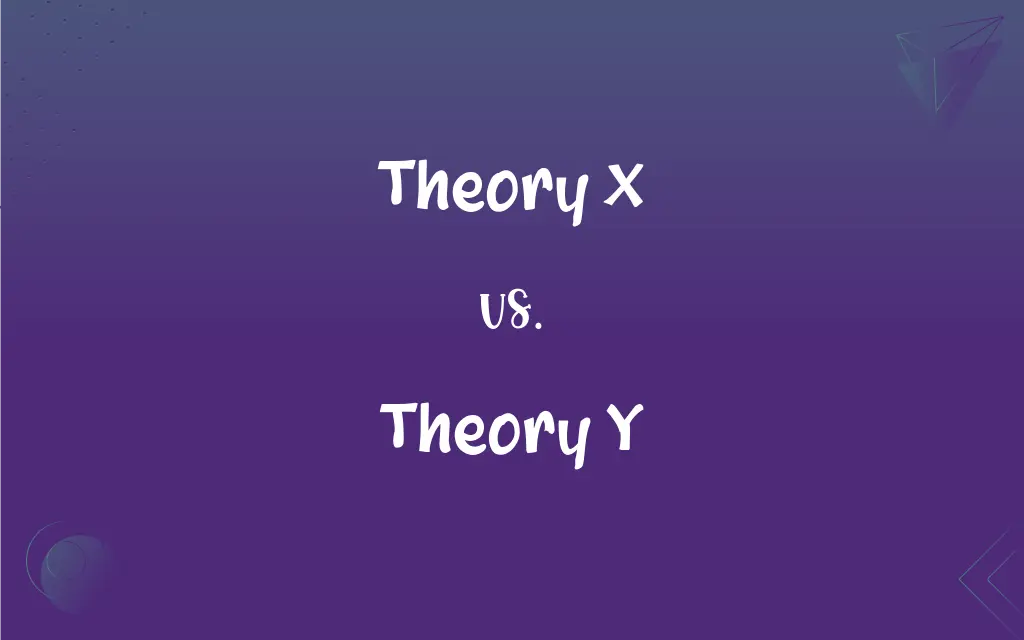Theory X vs. Theory Y: What's the Difference?
Edited by Janet White || By Harlon Moss || Published on November 25, 2023
Theory X assumes employees are inherently lazy and need strict control, while Theory Y views employees as self-motivated and seeking fulfillment through work.

Key Differences
Theory X posits that employees inherently dislike work and must be strictly controlled and coerced to perform. Conversely, Theory Y suggests that employees are self-motivated and thrive in environments that offer opportunities for creativity and problem-solving.
Under Theory X, employees are seen as needing direction and are motivated primarily by monetary rewards and penalties. In Theory Y, employees are viewed as seeking personal growth and fulfillment through their work, valuing opportunities for advancement and self-realization.
A Theory X environment is typically rigid, hierarchical, and task-focused, emphasizing efficiency and obedience. Theory Y promotes a more flexible, collaborative, and trust-based environment, encouraging innovation and employee participation in decision-making.
Theory X leadership relies on authoritative and transactional methods, focusing on rules and supervision. Theory Y leadership is more democratic and transformational, fostering a shared vision and empowering employees.
Theory X often results in minimal employee engagement and creativity, while Theory Y can lead to higher levels of job satisfaction, loyalty, and innovation.
ADVERTISEMENT
Comparison Chart
View of Employees
Lazy, needing direction
Self-motivated, seeking growth
Motivation
External (rewards, punishment)
Internal (fulfillment, achievement)
Management Style
Authoritative, controlling
Democratic, empowering
Work Environment
Rigid, task-focused
Flexible, people-focused
Employee Behavior
Minimal engagement
High job satisfaction, innovation
ADVERTISEMENT
Theory X and Theory Y Definitions
Theory X
Views employees as needing constant oversight.
Theory X supports a top-down approach in management.
Theory Y
Emphasizes intrinsic motivation and personal growth.
Theory Y believes in motivating employees through personal achievement.
Theory X
A management theory assuming employees inherently dislike work.
Under Theory X, strict supervision is deemed essential.
Theory Y
Focuses on employee fulfillment and creativity.
Theory Y supports environments that foster innovation.
Theory X
Focuses on extrinsic motivation through rewards and penalties.
Theory X uses performance incentives to motivate staff.
Theory Y
Advocates for a collaborative and trust-based work environment.
In Theory Y, teamwork and collaboration are highly valued.
Theory X
Relies on authoritative leadership styles.
Theory X leaders often make decisions without employee input.
Theory Y
Prefers democratic leadership and employee empowerment.
Theory Y leaders facilitate rather than dictate.
Theory X
Emphasizes control and direction in the workplace.
Theory X management often results in a rigid work environment.
Theory Y
A management theory that views employees as self-motivated.
Theory Y encourages employee participation in decision-making.
FAQs
What is Theory Y?
Theory Y is a management approach that views employees as self-motivated and seeking fulfillment through their work.
What type of leadership does Theory X promote?
Authoritative and transactional leadership styles.
How do companies implement Theory Y?
By encouraging employee participation, providing growth opportunities, and fostering a positive culture.
What is Theory X?
Theory X is a management concept that assumes employees are inherently lazy and need strict control.
How does Theory X view employee motivation?
It sees motivation as primarily driven by external factors like rewards and punishment.
How does Theory X affect the work environment?
It often leads to a rigid and strictly controlled work environment.
What motivates employees according to Theory Y?
Intrinsic factors like personal growth, achievement, and job satisfaction.
What leadership style is associated with Theory Y?
Democratic and transformational leadership styles.
Can Theory Y improve productivity?
Often, yes, as it motivates employees through empowerment and engagement.
Can a workplace combine both theories?
Yes, some workplaces blend elements of both to suit their specific needs.
How do start-ups typically view Theory X and Y?
Many start-ups lean towards Theory Y, valuing innovation and employee empowerment.
Are Theory X and Y applicable in all industries?
Their applicability can vary based on the industry, company culture, and workforce.
What is the work environment like under Theory Y?
It's more flexible, collaborative, and focused on people.
Does Theory X discourage innovation?
It can, as it doesn't typically encourage creativity and autonomy.
Can Theory X lead to high employee turnover?
Yes, due to its rigid and controlling nature.
Is Theory X still relevant today?
While considered outdated by some, aspects of it are still used in certain management practices.
What is the impact of Theory Y on employee satisfaction?
It usually leads to higher job satisfaction and engagement.
How do Theory X and Y influence company culture?
Theory X often leads to a more hierarchical culture, while Theory Y fosters a more open and inclusive culture.
Does Theory Y enhance employee loyalty?
Generally, yes, as it fosters a supportive and fulfilling work environment.
How do employees typically respond to Theory X?
They may comply due to necessity but often with minimal enthusiasm or creativity.
About Author
Written by
Harlon MossHarlon is a seasoned quality moderator and accomplished content writer for Difference Wiki. An alumnus of the prestigious University of California, he earned his degree in Computer Science. Leveraging his academic background, Harlon brings a meticulous and informed perspective to his work, ensuring content accuracy and excellence.
Edited by
Janet WhiteJanet White has been an esteemed writer and blogger for Difference Wiki. Holding a Master's degree in Science and Medical Journalism from the prestigious Boston University, she has consistently demonstrated her expertise and passion for her field. When she's not immersed in her work, Janet relishes her time exercising, delving into a good book, and cherishing moments with friends and family.






































































